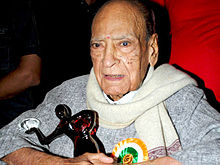A. K. Hangal
| A. K. Hangal | |
|---|---|

A. K. Hangal in 2011
|
|
| Born |
Avtar Kishan Hangal 1 February 1914 Sialkot, Punjab, British India |
| Died | 26 August 2012 (aged 98) Mumbai, Maharashtra, India |
| Cause of death | Respiratory disease |
| Other names | Padmabhushan Avtar Krishna Hangal |
| Occupation | Actor |
| Years active | 1929–1947 (freedom fighter), 1936–1965 (theater actor), 1965–2005 (film career), 1980–2012 (television career) |
| Notable work | Ram Shastri in Aaina Inder Sen in Shaukeen Imaam Saa'b in Sholay Bipinlal Pandey in Namak Haraam Brinda Kaka in Aandhi |
| Children | Vijay (Retired Bollywood photographer) |
Avtar Kishan Hangal (1 February 1914 – 26 August 2012), popularly known as A. K. Hangal, was an Indian freedom fighter from 1929–1947 and also stage actor from 1936–1965 and later became a character actor in Hindi language films from 1966–2005. His most notable roles are as Ram Shastri in Aaina (1977), as the Inder Sen in Shaukeen, as Bipinlal Pandey in Namak Haraam, as Imaam Saa'b in Sholay, as Anokhelal in Manzil and the antagonist in Prem Bandhan and the 16 films he did with Rajesh Khanna. He has acted in around 225 Hindi films in a career spanning from 1966 to 2005.
Born into a Kashmiri Pandit family, he spent his childhood and youth in Peshawar, where he had performed in theatre for some major roles.His family home was inside Reti Gate as mentioned in his memoirs. His father's name was Pandit Hari Kishan Hangal. His mother's name was Ragia Hundoo. He had two sisters. Bishan and Kishan. He was married to Manorma Dar from Agra. However, his primary occupation for the early part of his life was that of a tailor. He was an active participant in the Indian freedom struggle from 1929–1947. He joined Shree Sangeet Priya Mandal, a theatre group in Peshawar in 1936 and continued to act in many plays in undivided India till 1946. Following his father's retirement, the family moved from Peshawar to Karachi. He moved to Bombay after the Partition of India in 1949 after 3 years in prison in Pakistan. He was involved with the theatre group IPTA along with Balraj Sahni and Kaifi Azmi, both of whom had Marxist leanings. He was jailed because he was a communist in Karachi for two years from 1947–1949 and after his release came to India and settled in Mumbai. He later acted in many plays in theatres in India from 1949–1965.
...
Wikipedia
